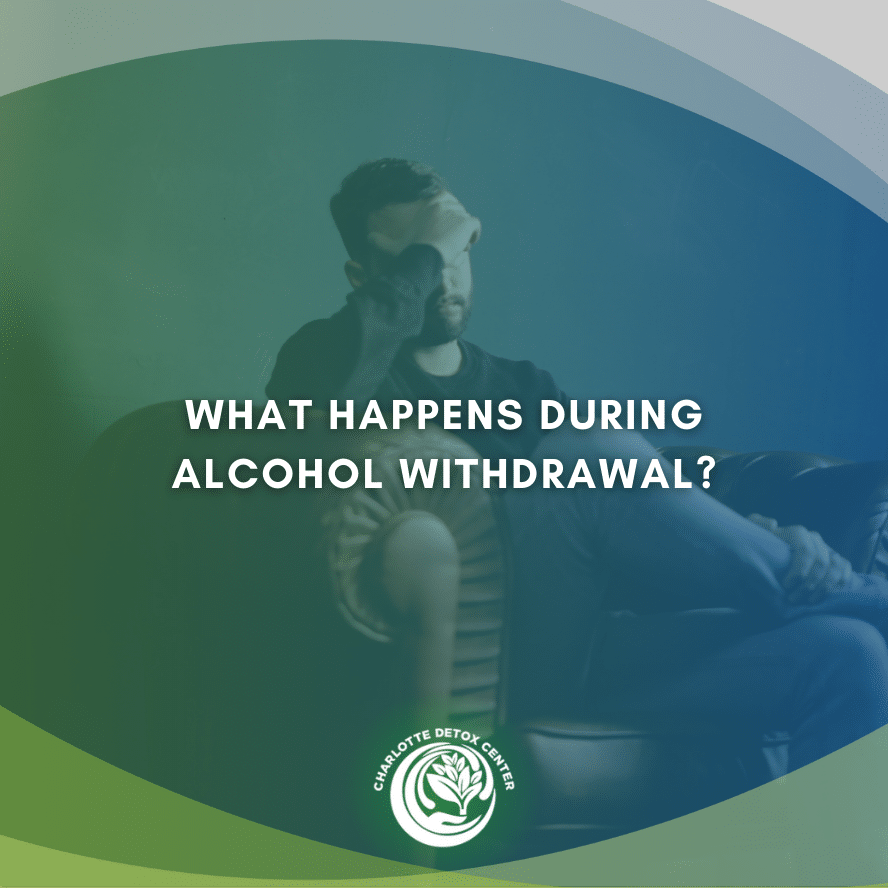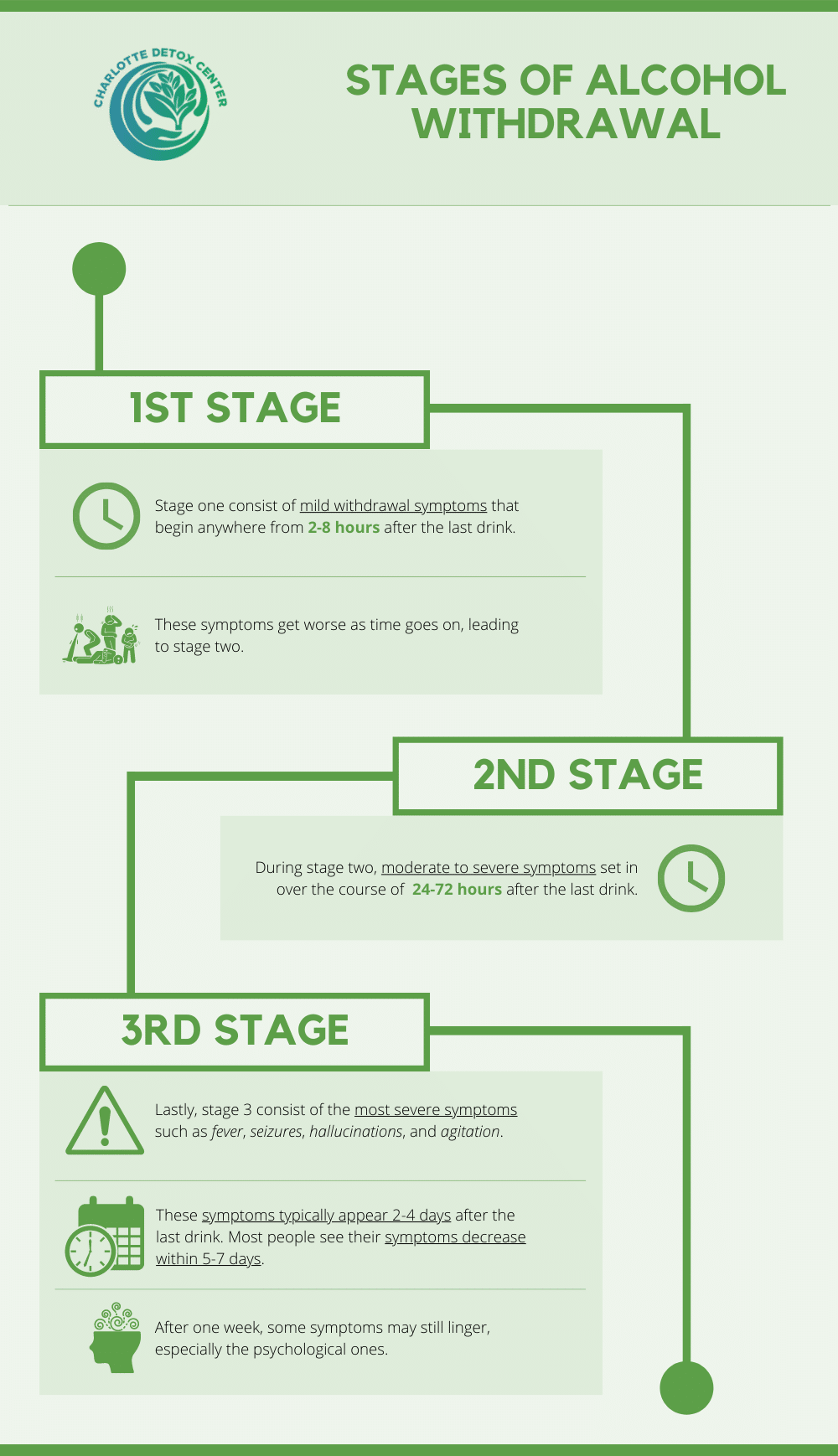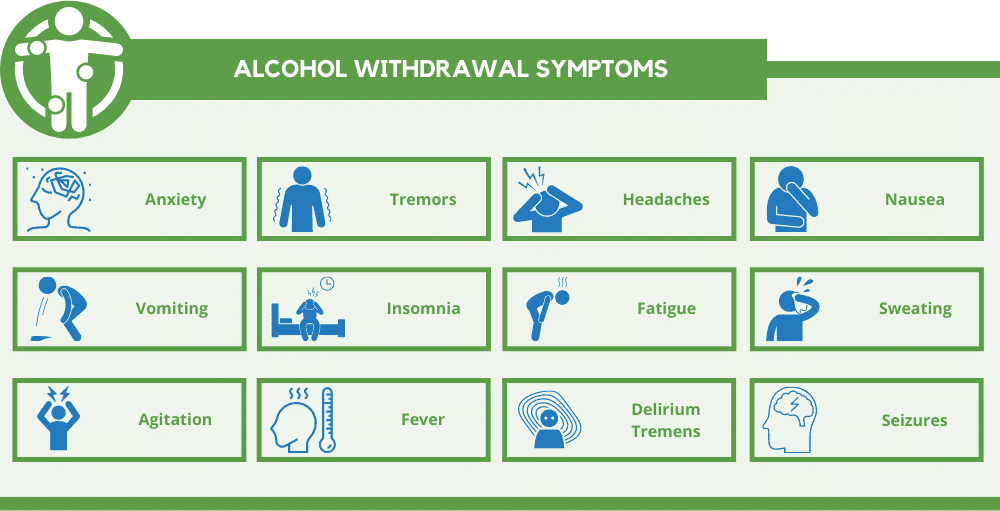What Happens During Alcohol Withdrawal?

Medically Verified: 2/1/24
Medical Reviewer
Chief Editor

All of the information on this page has been reviewed and verified by a certified addiction professional.
Alcohol withdrawal happens when a person who is addicted to alcohol abruptly stops drinking. After giving up prolonged, heavy alcohol abuse, the body experiences extreme changes that manifest in the form of unpleasant withdrawal symptoms. Unfortunately, the symptoms are dangerous and can provoke life-threatening complications. Although severe symptoms rarely last longer than a week, a week can seem like a long time if you’re feeling sick.
The symptoms of alcohol withdrawal vary from person to person depending on a variety of factors. If you experience withdrawal symptoms when you stop drinking, it’s time to consider getting help from an alcohol detox center. Medications, counseling, and support all assist the detoxification process, making it safe, comfortable, and easy.
What Causes Alcohol Withdrawal Syndrome?
People who abuse alcohol on a regular basis run the risk of becoming physically dependent on alcohol. Over time, the brain and the body get used to these abnormal drinking patterns. Consequently, when a person who is dependent on alcohol stops drinking, their mind and body crave alcohol. It takes time for the body to adjust to functioning without a drink and this adjustment period involves painful alcohol withdrawal symptoms.
Withdrawal symptoms are the direct result of the effects alcohol has on multiple bodily functions. For example, drinking suppresses the central nervous system and has sedative-like effects on the brain. As a result, certain neurotransmitters are suppressed, leading to a feeling of relaxation when drinking. In the case of someone with alcohol use disorder, the brain and body are exposed to copious amounts of alcohol on a regular basis, so the body becomes addicted to it. When a person stops drinking, their neurotransmitters are no longer being suppressed, and the brain desperately attempts to adjust to functioning without alcohol.[1] Although alcohol withdrawal symptoms are temporary, they are extremely difficult to deal with without help from a professional alcohol detox.
Alcohol Withdrawal Symptoms & Timeline
The severity and duration of alcohol withdrawal depend on a variety of factors. If you have been drinking for several years your symptoms may be more severe and last longer than someone who has only been addicted to alcohol for a few months. Other factors that contribute to the intensity and duration of symptoms are:
- Mental health
- Physical health
- History of alcohol addiction/past withdrawal experiences
- Age
- Weight
- Gender
- Family history
- Medications
- Addiction to other drugs
Stages of Alcohol Withdrawal
Alcohol withdrawal symptoms may occur just hours after taking the last drink and last for up to a week or more. Withdrawals are broken up into three stages depending on the severity of symptoms.
While only 5% of people experience delirium tremens (DTs), it’s always a possibility. Both seizures and DTs are extremely dangerous and potentially fatal, which is why you should never attempt to detox from alcohol alone.[2] Instead, consider seeking help from an alcohol detox near you.


How Alcohol Detox Can Help
During alcohol detox, patients are closely monitored by medical staff until their symptoms stabilize. In most cases, alcohol withdrawal requires medical detox. This involves the use of medications to treat symptoms like nausea, insomnia, seizures, dehydration, and more.
Benzodiazepines, like Valium and Ativan, are some of the most commonly used medications for alcohol detox. Benzos help reduce the over-activity of the central nervous system while the body tries to restore its natural balance. These medications also help prevent seizures and agitation while making patients more comfortable. Due to potential spikes in blood pressure, medications like Clonidine may also be administered during alcohol detox.[3] A common problem with people who abuse alcohol is malnutrition or vitamin deficiencies, so supplements and a healthy diet are regulated by professionals to further aid the alcohol withdrawal process.
Throughout a patient’s stay in detox, their blood pressure, breathing, heart rate, and temperature are closely monitored to ensure their safety. Furthermore, medical professionals are prepared to intervene in the event of a complication or emergency.
Nobody should ever attempt to detox from alcohol without professional help. Even if withdrawal symptoms aren’t fatal, they can be so painful and uncomfortable that people end up drinking again. Alcohol detox centers not only provide medical care but counseling and emotional support as well.
Alcohol Detox in Charlotte, North Carolina
Medical detox programs for alcohol abuse provide comprehensive care in a supportive environment to aid patients throughout all stages of alcohol withdrawal and detox. Going to detox is scary, but it’s the first step on the road to recovery from alcoholism. Under the supervision of physicians and clinicians, alcohol withdrawal becomes a much easier process.
If you or a loved one experiences alcohol withdrawals when not drinking, contact us today. Our alcohol detox center in Charlotte, North Carolina can help.
References:
